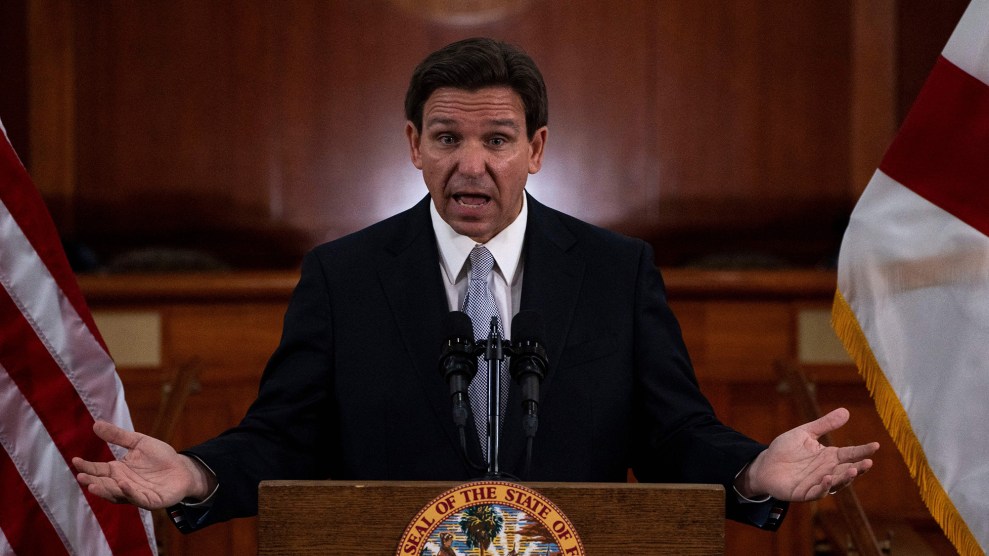
Florida Governor Ron DeSantis answers questions from the media following his "State of the State" address in Tallahassee on March 7, 2023. CHENEY ORR/AFP via Getty
As a leading contender for Republican presidential nomination next year, Ron DeSantis has the ability to force the rest of his party to quickly take sides on political fights. That’s what happened this week, after the Florida governor described the Russian invasion of Ukraine as a “territorial dispute” in which the United States does not have a “vital interest.” On one side of this GOP divide is former President Donald Trump, a Putin apologist who is pulling his supporters toward an isolationist posture. On the other side, Republicans who might prefer not to criticize Trump or DeSantis are now being forced to disagree with the two GOP frontrunners by arguing that the war is indeed important to US interests.
DeSantis’ comments may have hastened the already growing fissures in the Republican Party over Ukraine, forcing those who want to support Ukraine to take a stand. On the Sunday shows today, three more Republicans criticized DeSantis’ isolationist approach.
In his statement to Tucker Carlson—who has criticized aid to Ukraine and its president, Volodymyr Zelensky—DeSantis argued that checking the power of China is among the US’ top priorities while safeguarding Ukraine is not. A number of prominent Republicans clearly disagree, arguing, among other things, that an isolationist approach toward Ukraine would signal to China that the US would do little to counter Chinese aggression toward Taiwan. Chinese PresidentXi Jinping “wants to see how we respond [to the war in Ukraine], whether or not we can keep our allies together, whether or not NATO stays together or whether or not it strengthens NATO,” Sen. Mike Rounds (R-SD) said on NBC’s Meet the Press. “So this is a bigger picture than just territory.”
Rounds tried not to directly confront DeSantis, but he didn’t dispute the idea that DeSantis’ statement may have been a result of primary politics.
There’s “a clear vital national interest to support what is going on in Ukraine,” New Hampshire Gov. Chris Sununu, a Republican, said Sunday on CNN’s State of the Union. Sununu, who has criticized DeSantis in the past and is considering his own run for president, argued that if the United States were to back out of the conflict, it would embolden China and Russia and send a message of weakness to US allies.
Former Vice President Mike Pence, who is also mulling a 2024 presidential run, likewise came down on the other side from DeSantis. “The war in Ukraine is not a territorial dispute,” he told ABC’s Jon Karl in an interview that aired in part on ABC’s This Week on Sunday. “It’s a Russian invasion.”
Both Sununu and Pence argued that curtailing support for Ukraine now could land the US in the position of having to send troops to Europe to defend NATO allies in the future.
DeSantis’ comments to Carlson came ahead of three important developments in the war: the International Criminal Court issuing a warrant for Putin’s arrest on war crimes; Putin’s visit to the captured Ukrainian city of Mariupol this weekend, staking claim to the territory; and Xi’s upcoming visit to Russia. The Chinese leader’s trip, in particular, underscores the point DeSantis’ critics are making.
But DeSantis, who is courting Trump supporters as he builds toward an expected presidential campaign, chose to adopt a view closer to Trump’s. Trump has said that, were he president, he would have let Russia annex parts of Ukraine. When it comes to winning a GOP primary, taking the Trump position may prove to be the safest bet. That’s the side DeSantis picked, and now he’s forcing other presidential hopefuls and GOP leaders to make a different bet.
















